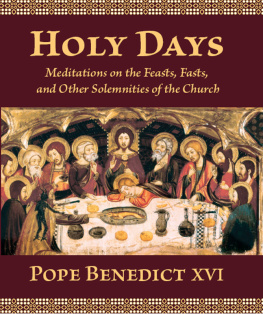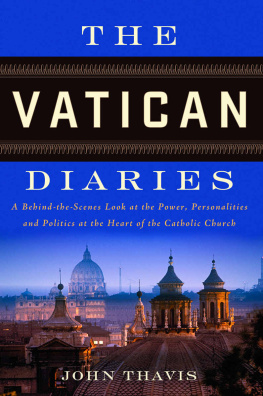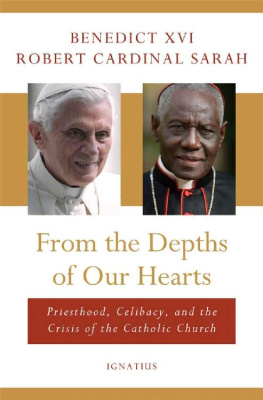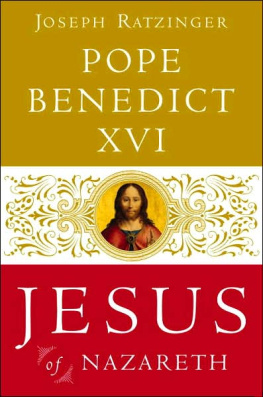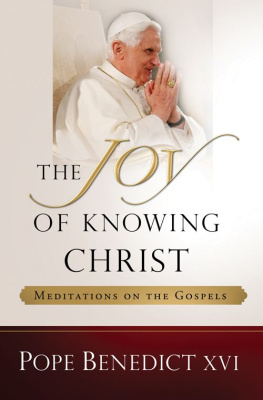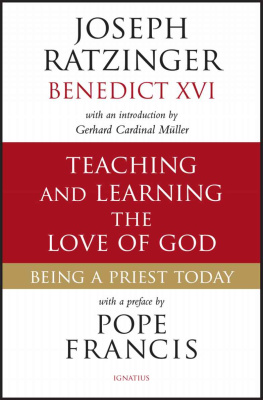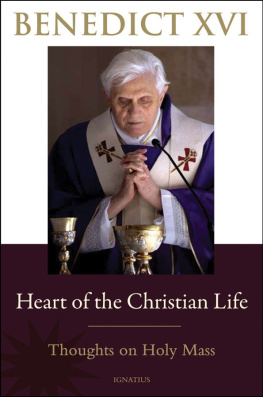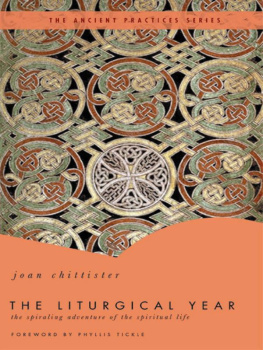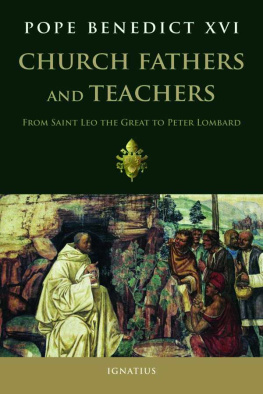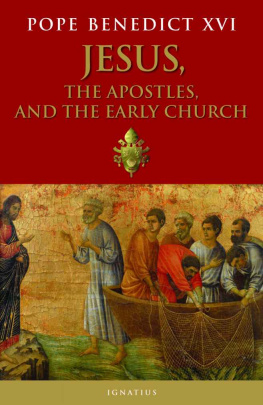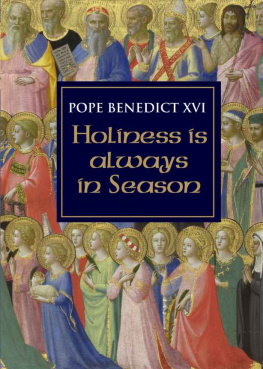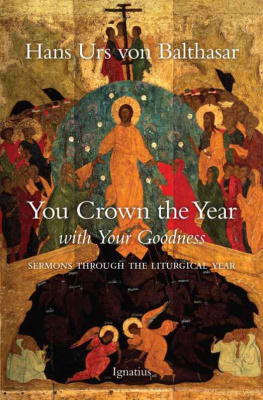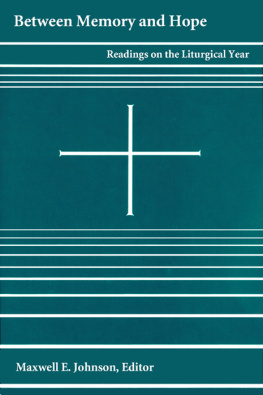HOLY DAYS
Meditations on the Feasts, Fasts, and
Other Solemnities of the Church
Pope Benedict XVI
Edited and Annotated by
JEAN-MICHEL COULET
Introduction and Annotations Translated by
D. C. SCHINDLER
A Giniger Book
published in association with
WILLIAM B. EERDMANS PUBLISHING COMPANY
GRAND RAPIDS, MICHIGAN / CAMBRIDGE, U.K.
HOLY DAYS
Contents
2012 The K. S. Giniger Company
The Words of Pope Benedict XVI Libreria Editrice Vaticana
All rights reserved
Published 2012 by
Wm. B. Eerdmans Publishing Co.
2140 Oak Industrial Drive N.E., Grand Rapids, Michigan 49505 /
P.O. Box 163, Cambridge CB3 9PU U.K.
www.eerdmans.com
Published in association with
The K. S. Giniger Company
1045 Park Avenue, New York, NY 10028
17 16 15 14 13 12 7 6 5 4 3 2 1
Library of Congress Cataloging-in-Publication Data
Benedict XVI, Pope, 1927
Holy days: meditations on the feasts, fasts, and other solemnities of the church /
Pope Benedict XVI; edited and annotated by Jean-Michel Coulet;
introduction and annotations translated by D. C. Schindler.
p. cm.
A Giniger book.
ISBN 978-0-8028-6518-2 (pbk.: alk. paper)
ISBN 978-1-4674-3651-9 (epub)
1. Fasts and feasts Catholic Church. I. Title.
BV43.B43513 2012
242.3 dc23
2012013198
For Benedict XVI, the liturgical year is a great voyage of faith on which the Church sets us out. The feast days in the Churchs liturgical calendar give a rhythm to our lives as we pass through the year, a rhythm that follows the major events of Jesus life as recounted in the Gospels. The presentation of these holy days with Benedict XVIs own words helps us better understand the mystery in which the pope invites us to participate. From the beginning of his pontificate, he has not ceased to show us how to come to know and love the Church, and has led us along the path of holiness. He enables us to touch, with our own hands, the grandeur and beauty of the divine mystery: in his words, It is Christ himself who is at the heart of the liturgy.
It is important, especially in this secularized age, to rediscover certain practices that form us, practices that guide and deepen our path. We are like laborers who dig ever-deeper furrows in the earth with the plow of our heart, in order that we may grow ever higher. God wishes to renew the world by way of the same path that Christ himself followed. Thus, everything is meant to unfold according to the humble and patient logic of the grain of wheat, which, having fallen to the ground, dies in order to give life.
We have to learn to know and live liturgical time by recalling, again and again, that this time is nourished by a constant relationship between tradition and progress. These two concepts complement each other harmoniously, because tradition is a living reality, and includes within itself the seed of development, of progress. Liturgy is an ensemble of acts, symbols, and words, by means of which the Church, made up of women and men, offers worship to God and hands down the knowledge of God to others. The definitive goal always remains the glory of God and the sanctification of his people.
The meditations on the feast days of the Church that are offered in this little book are excerpts selected from the words pronounced by Pope Benedict XVI over the course of the liturgical year as it is lived in Rome. It begins with Advent and concludes with the feast of Christ the King.
JEAN-MICHEL COULET
Editor of the French editions of the Vatican newspaper
LOsservatore Romano
Advent (derived from the Latin word adventus) is the time in which we experience the presence of eternity and eagerly await its arrival. For precisely this reason it is in a particular way the time of joy, an interior joy that no suffering can take away. It is joy over the fact that God made himself a child. This joy, which we carry hidden within us, gives us the courage to continue forward into the future with confidence. Present among us, it speaks to us in different ways: in the Holy Scriptures, in the liturgical year, in the saints, in the events of daily life, and in the whole of creation.

First Vespers of Advent
Everyone knows how important the liturgy is to Pope Benedict XVI. The beginning of the liturgical year thus deserves to be celebrated in a solemn way by a Mass that introduces the people of God into the new year. This celebration takes place in St. Peters, and follows closely the celebration of Christ the King. The term advent can be translated as presence, arrival, coming.

Advent, this powerful liturgical season that we are beginning, invites us to pause in silence to understand a presence. It is an invitation to understand that the individual events of the day are hints that God is giving us, signs of the attention he has for each one of us. How often does God give us a glimpse of his love! To keep, as it were, an interior journal of this love would be a beautiful and salutary task for our life! In the language of the ancient world it was a technical term used to indicate the arrival of an official or the visit of the king or emperor to a province. However, it could also mean the coming of the divinity that emerges from concealment to manifest himself forcefully or that was celebrated as being present in worship. Christians used the word advent to express their relationship with Jesus Christ: Jesus is the King who entered this poor province called earth to pay everyone a visit; he makes all those who believe in him participate in his coming, all who believe in his presence in the liturgical assembly. The essential meaning of the word adventus was: God is here, he has not withdrawn from the world, he has not deserted us. Even if we cannot see and touch him as we can tangible realities, he is here and comes to visit us in many ways.
First Sunday of Advent
This Sunday, by the grace of God, a new liturgical year opens, of course, with Advent, a season of preparation for the birth of the Lord. The Second Vatican Council, in the Constitution on the Liturgy, affirms that the Church in the course of the year... unfolds the whole mystery of Christ from the Incarnation and Nativity to the Ascension, to Pentecost and the expectation of the blessed hope of the Coming of the Lord. The Council insists on the fact that the center of the liturgy is Christ, around whom the Blessed Virgin Mary, closest to him, and then the martyrs and the other saints who sing Gods perfect praise in heaven and intercede for us, revolve like the planets around the sun. This is the reality of the liturgical year seen, so to speak, from Gods perspective. And from the perspective, let us say, of humankind, of history and of society, what importance can it have? The answer is suggested to us precisely by the journey through Advent on which we are setting out today. The contemporary world above all needs hope; the developing peoples need it, but so do those that are economically advanced. We are becoming increasingly aware that we are all on one boat and together must save each other. Seeing so much false security collapse, we realize that what we need most is a trustworthy hope. This is found in Christ alone. As the Letter to the Hebrews says, he is the same yesterday and today and for ever (Heb. 13:8).
December 8: The Immaculate Conception, the Second Sunday of Advent
According to tradition, the pope comes to the Piazza di Spagna, in Rome, in order to say a prayer at the Virgins feet. He entrusts the city and the world to the protection of the Immaculate Conception. Until recently, he also used to go to Santa Maria Maggiore in order to pray before the icon of the

